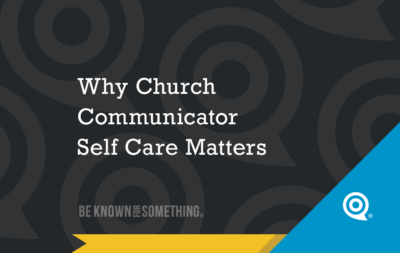Does a Church need marketing? (maybe it doesn’t)

Is marketing, branding, publicity, or advertising something that most churches should be doing? Or should a Pastor be concerned about these practices? How do the timeless principles of the Gospel meet the enormous challenges of our current culture? It’s not a simple answer. Let’s examine the necessity of marketing for a church and the considerations that may lead some to think otherwise.
Firstly, let’s define this scary word: marketing. At its core, it’s simply using a strategic process of effectively communicating a product or service to a particular audience that needs it.
But should the Church use business principles to accomplish a spiritual task? Is there a line that we shouldn’t cross? Let’s look at three reasons a church should be cautious of marketing:
- Authenticity concerns: Some pastors worry that intensive marketing efforts compromise the authenticity of their biblical message. Fearing that emphasizing marketing tactics could lead to a perception of the church as a cold “brand” rather than a spiritual “community”. Also, for pastors who prioritize a more intimate and personal approach, the fear of appearing overly promotional might outweigh the perceived benefits of marketing. Perhaps there needs to be a balance between the church and marketing ideas.
- Dependency on consumer culture: Some pastors may have reservations about adopting marketing strategies that seem too closely aligned with consumer culture. Worrying that relying heavily on marketing tactics could inadvertently conform the church to worldly standards rather than focusing on the transformative power of the Gospel. Balancing outreach with a commitment to counter-cultural values becomes a central concern. It’s the tension of balancing “Do not be conformed to this world, but be transformed by the renewal of your mind…” (Romans 12:2) with effective marketing principles. The sad reality is that our world, with a plethora of choices faced daily, has become a consumer. Constantly looking for the “what’s best for me” mentality. Effective communication is telling them why what you’re offering is best for them.
- Trusting in God’s guidance: Pastors may, rightly, believe that the church’s growth and impact should be solely reliant on divine guidance. Therefore, they may feel that an excessive focus on marketing strategies could shift the emphasis from God’s leading to human efforts. For these pastors, placing complete trust in God’s plan might mean relying less on strategic marketing initiatives. “Trust in the Lord with all your heart, and do not lean on your own understanding…” (Proverbs 3:5-6) feels like a church should reject any wisdom that comes from people and marketing principles. It doesn’t take too long to realize that we will always have tension between these two thoughts: trusting in God to use our marketing attempts.
However, there are also three compelling reasons to proceed with effective marketing strategies:
- Reach a wider audience. The Bible emphasizes the importance of spreading the Gospel to the entire world. What a huge challenge and responsibility. Effective marketing allows a church to reach its local audience and extend its reach beyond its immediate community (making the message of Christ accessible to a broader audience). By leveraging branding, digital platforms, social media, and other marketing tools, a church can fulfill the call to share the Good News globally, reaching people who may not have encountered it otherwise. Effective marketing is about crafting the correct message, to reach wider, by focusing locally first. “Go into all the world and proclaim the gospel to the whole creation.” (Mark 16:15) is the call to evangelize as efficiently as possible. Prayerful marketing appears to be the ultimate solution.
- Better stewardship of resources. Efficient and strategic marketing aligns with responsible stewardship. The parable of the talents emphasizes being faithful to what is entrusted to us. By utilizing marketing effectively, a church can maximize its impact, ensuring that the time, talents, and resources invested in outreach efforts yield meaningful results. This aligns with the biblical principles of stewardship and faithful management. “His master said to him, ‘Well done, good and faithful servant. You have been faithful over a little; I will set you over much.’” (Matthew 25:21) requires this of everyone. Let’s effectively use what’s been given us: wisdom, wealth, and workload.
- Create a welcoming community without compromising your message. Church marketing isn’t just about attracting “numbers”; it’s about building up a “community” of believers. Clear communication through well-designed websites, engaging social media, and consistent branding fosters this welcoming environment. People will want to be part of what God and you are doing. This aligns with the biblical call to edify and build up the body of believers. Marketing becomes an effective tool for creating that space where individuals feel welcomed, valued, and connected to the larger family of faith. Done correctly, it’s practicing “Let all things be done for building up.” (1 Corinthians 14:26). The local church’s marketing goal should be to eliminate any temporal barriers that keep our audiences from hearing the eternal message of salvation.
In conclusion, with full disclosure, to this believer who’s been coaching Pastors and churches for over three decades in the communication arena, I see church marketing as a way to accomplish what Jesus asked us to do in the Great Commission. For your church, you need to decide what the balance needs to be.

Want 25 Game-Changing Resolutions?
Related Posts

Why Church Communicator Self Care Matters
Church communicators are often the quiet carriers of pressure. You’re shaping messages, managing platforms, responding to urgency, and translating vision

When Church Communication Falls on One Pastor
For many solo pastors, church communication becomes one more responsibility added to an already full plate. You preach, lead, counsel,

Church Content Checkup: 6 Key Questions
Clear communication starts long before you hit “send.” It begins with evaluating your church content, so you communicate what truly

